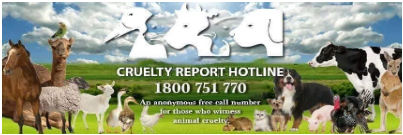 If the Minister for Agriculture were to endorse at least one officer from each local council under the Prevention of Cruelty to Animals Act 1986 (POCTA) provisions (section 18), this would add at least 120 new animal welfare officers/inspectors to combat animal cruelty within their area. This would alleviate the workload of authorised enforcement agencies i.e.( RSPCA/VicPol) in the town or city in which an alleged offence has occurred. A section should also be added into POCTA as it was back in the 80’s before it was repealed, that half of the fines from a successful prosecution be paid to council and the other half to state revenue. This would also give council an incentive to work toward costs as RSPCA now do subsequently no out of pocket expenses.
If the Minister for Agriculture were to endorse at least one officer from each local council under the Prevention of Cruelty to Animals Act 1986 (POCTA) provisions (section 18), this would add at least 120 new animal welfare officers/inspectors to combat animal cruelty within their area. This would alleviate the workload of authorised enforcement agencies i.e.( RSPCA/VicPol) in the town or city in which an alleged offence has occurred. A section should also be added into POCTA as it was back in the 80’s before it was repealed, that half of the fines from a successful prosecution be paid to council and the other half to state revenue. This would also give council an incentive to work toward costs as RSPCA now do subsequently no out of pocket expenses.

In the past I have advocated for an Independent Office of Animal Welfare, but further research and forward thinking has changed my mind and I therefore submit the following suggestions regarding the above.
There are 120 municipalities in the state of Victoria, each have a local laws team that deal with animals including the Domestic Animals Act and other related acts of parliament. Some councils/shires may already have their officers endorsed under section 18 of POCTA to enforce and act under the provisions of POCTA.
From the 120 councils/shires each have officers that total at least 1 and some 12+ in the bigger councils and towns i.e. Shepparton, Bendigo, Ballarat, Geelong and Casey. Casey was the first to prosecute under POCTA new puppy farm sections successfully. If the Minister would endorse at least one officer from each council under POCTA provisions (section 18) that will at least give animal welfare 120 + new officers/inspectors to combat animal cruelty within the region of their area.
This would alleviate the workload of authorised enforcement agencies i.e.( RSPCA/VicPol) in the town or city in which an alleged offence has occurred. Plus a section should also be added (into POCTA) as it was back in the 80’s before it was repealed, that half of the fines from a successful prosecution be paid to council and the other half to state revenue. This would also give council an incentive to work toward costs as RSPCA now do subsequently no out of pocket expenses.
Training of these officers are on par with RSPCA inspector, rangers having the opportunity of courses offered prior to starting their occupation at council. Court and prosecutions would also be on par with RSPCA procedures.
RSPCA could then engage in their policies of supplying pet ambulance services, animal rescues, education and rehoming.
Sincerely,
Barrie R Tapp
Animal Cruelty Hotline Australia; Dipl. equine studies, Police academy det training; JP.

Add comment